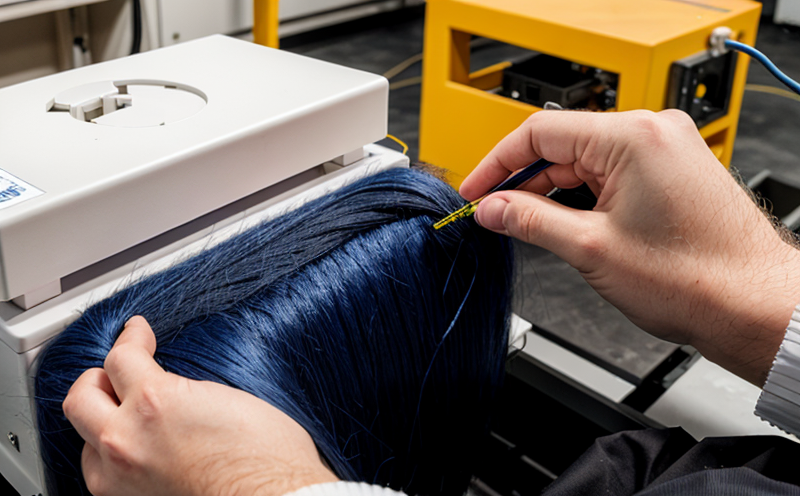ISO 6989 Microscopic Examination of Fibers
The ISO 6989 standard provides a comprehensive approach to identifying and analyzing fibers using microscopic examination techniques. This method is particularly useful in the textile sector for quality control, compliance assurance, and research and development (R&D). The procedure involves examining samples under both light microscopy and scanning electron microscopy (SEM) to identify fiber characteristics such as morphology, crystallinity, and chemical composition.
The process begins with careful preparation of the sample. This includes selecting an appropriate representative portion from a larger batch or product, ensuring that it is free from contaminants. The specimen is then mounted on a suitable substrate and coated if necessary for SEM analysis. Once prepared, the samples are examined under various magnifications to capture detailed images.
The examination process involves several key steps:
- Initial macroscopic inspection to identify gross characteristics.
- Optical microscopy at low power to observe overall structure and texture.
- High-power optical microscopy for detailed observation of fiber morphology, surface features, and defects.
- SEM analysis for high-resolution imaging of the sample's surface and internal structures.
The results from these examinations are then compared against reference materials and established criteria to make accurate identifications. This process is crucial in ensuring consistency across production batches and in meeting regulatory requirements.
The ISO 6989 standard ensures that all tests are conducted under controlled conditions, which helps in maintaining reproducibility and reliability of the results. The use of advanced imaging techniques allows for precise identification even when dealing with complex mixtures or very small fibers.
This service is essential for several reasons within the textile industry:
- Quality Control: Identifying defects and inconsistencies early in the manufacturing process helps to minimize waste and improve overall product quality.
- Compliance: Ensures that products meet international standards, thereby facilitating trade across borders without encountering regulatory barriers.
- R&D Support: Provides valuable insights into fiber behavior under different conditions which can drive innovation in new textile applications.
The comprehensive nature of the ISO 6989 standard makes it an indispensable tool for quality managers, compliance officers, and R&D engineers working within the textile sector. By leveraging this service, businesses can enhance their competitive edge by ensuring that every product they produce adheres to high standards of integrity and performance.
Why Choose This Test
The ISO 6989 Microscopic Examination of Fibers is a critical tool for any organization involved in the textile industry. Here are several reasons why choosing this service can be advantageous:
- Precision and Accuracy: The use of advanced optical and electron microscopy ensures that even minute differences between fibers can be detected and accurately identified.
- Comprehensive Analysis: This service offers a holistic approach to fiber analysis, covering both macroscopic and microscopic aspects which provide a full picture of the sample's characteristics.
- Regulatory Compliance: By adhering strictly to international standards like ISO 6989, organizations can ensure that their products meet all necessary regulatory requirements, thus avoiding potential fines or product recalls.
- Innovation Support: Understanding fiber behavior under various conditions enables R&D teams to explore new possibilities and improve existing products.
- Cost Efficiency: Early detection of issues through thorough testing can prevent costly rework during production cycles.
- Enhanced Reputation: Consistently high-quality products built on rigorous testing protocols can significantly enhance a company's reputation among consumers and partners alike.
In summary, selecting the ISO 6989 Microscopic Examination of Fibers service ensures that your organization stays at the forefront of textile innovation while maintaining stringent quality controls. This translates into better customer satisfaction and long-term business success.
International Acceptance and Recognition
The ISO 6989 standard enjoys widespread acceptance globally due to its rigorous methodologies and consistent application across different environments. It is recognized by various national standards bodies including ASTM International, British Standards Institution (BSI), Canadian Standards Association (CSA), European Committee for Standardization (CEN), and others.
Many countries have adopted the ISO 6989 standard as part of their national regulations. For instance, in Europe, the European Union Directive on Product Safety requires conformity assessments based on international standards like ISO 6989 to ensure safety and reliability in textile products.
The recognition extends beyond regulatory frameworks; major brands and retailers also mandate compliance with such standards for sourcing raw materials and finished goods. This global acceptance underscores the importance of this service not only from a legal standpoint but also as a best practice across industries.
Companies adopting ISO 6989 can leverage these recognitions to demonstrate their commitment to excellence, thereby attracting more customers and partners. Moreover, it facilitates smoother international transactions since there is less need for translation or adaptation of standards between countries.
Competitive Advantage and Market Impact
The ISO 6989 Microscopic Examination of Fibers offers significant competitive advantages that can significantly impact a business’s market position:
- Differentiation: By offering superior quality assurance through advanced fiber identification, companies can differentiate themselves from competitors who may not adhere to such stringent testing protocols.
- Premium Pricing: Higher standards often translate into higher prices, allowing businesses to command premium pricing for their products. This is especially true in luxury goods markets where perceived value plays a crucial role.
- Better Customer Trust: Transparent and robust quality assurance processes build trust with customers, leading to increased loyalty and repeat business.
- Predictable Performance: Consistent results across different production runs help manufacturers predict performance more accurately, reducing variability and enhancing reliability.
- Sustainable Practices: Advanced fiber identification allows for better selection of sustainable materials, which appeals increasingly to environmentally conscious consumers.
In today's competitive marketplace, where brands are constantly striving to stand out, adhering to international standards like ISO 6989 not only enhances operational efficiency but also strengthens brand identity. This leads to enhanced market penetration and stronger positions in both domestic and export markets.





